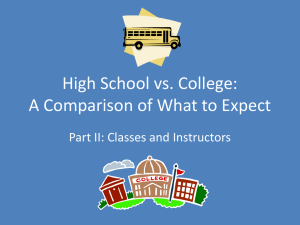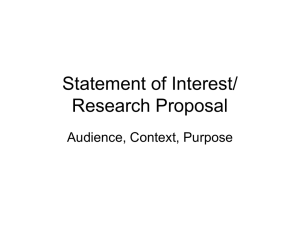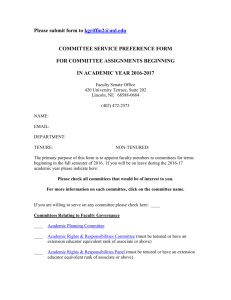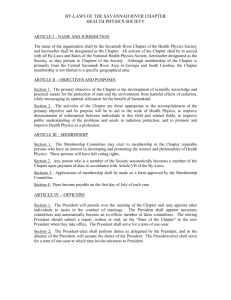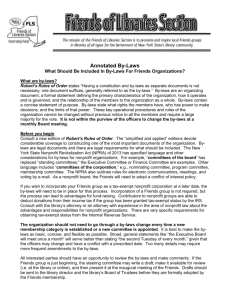Social Work - The University of Texas at Austin
advertisement
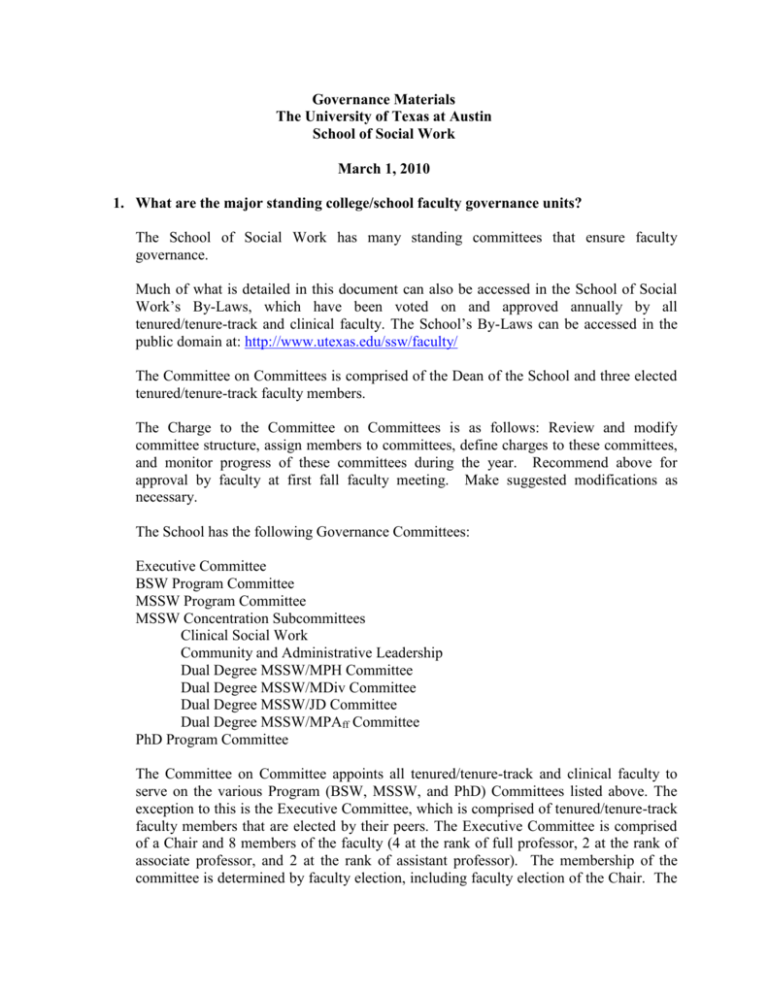
Governance Materials The University of Texas at Austin School of Social Work March 1, 2010 1. What are the major standing college/school faculty governance units? The School of Social Work has many standing committees that ensure faculty governance. Much of what is detailed in this document can also be accessed in the School of Social Work’s By-Laws, which have been voted on and approved annually by all tenured/tenure-track and clinical faculty. The School’s By-Laws can be accessed in the public domain at: http://www.utexas.edu/ssw/faculty/ The Committee on Committees is comprised of the Dean of the School and three elected tenured/tenure-track faculty members. The Charge to the Committee on Committees is as follows: Review and modify committee structure, assign members to committees, define charges to these committees, and monitor progress of these committees during the year. Recommend above for approval by faculty at first fall faculty meeting. Make suggested modifications as necessary. The School has the following Governance Committees: Executive Committee BSW Program Committee MSSW Program Committee MSSW Concentration Subcommittees Clinical Social Work Community and Administrative Leadership Dual Degree MSSW/MPH Committee Dual Degree MSSW/MDiv Committee Dual Degree MSSW/JD Committee Dual Degree MSSW/MPAff Committee PhD Program Committee The Committee on Committee appoints all tenured/tenure-track and clinical faculty to serve on the various Program (BSW, MSSW, and PhD) Committees listed above. The exception to this is the Executive Committee, which is comprised of tenured/tenure-track faculty members that are elected by their peers. The Executive Committee is comprised of a Chair and 8 members of the faculty (4 at the rank of full professor, 2 at the rank of associate professor, and 2 at the rank of assistant professor). The membership of the committee is determined by faculty election, including faculty election of the Chair. The terms are as follows: Assistant Professors – 1 year; Associate and Full Professors – 2 years; Chair – 2 years. The Charge to the Executive Committee is as follows: 1) Recommendations on hiring, faculty reviews, tenure and promotion, termination, leaves of absence, and retirements for faculty, including lecturers, and visiting scholars. 2) Faculty/staff awards. 3) Develop policies and procedures for annual faculty evaluations. 4) Conduct faculty annual and post tenure reviews. 5) Advisory to the Dean on School priorities and other matters as needed. The charges for the remaining Governance Committees can be found in the School of Social Work’s By-Laws. 2. Does the college/school have general faculty meetings? Yes. We typically meet as a faculty once per month during each long semester. Article III in our School’s By-Laws addresses Faculty Meetings (see below): Article III – Faculty Meetings Section A. The Faculty of the School of Social Work shall meet at least once in each semester. It will discuss and vote on all major changes in program and curriculum that affect the School, in accordance with the Handbook of Operating Procedure, Chapter 1. Section B. Special sessions shall be held at the call of the Dean or upon the written request of not less than five members of the faculty in Categories 1 and 2 (see item number 3 below for a definition of Categories 1 and 2). Section C. The Dean of the School of Social Work shall chair the faculty meetings. In the absence of the Dean, the Dean shall designate who will preside. Section D. At least fifty percent of the faculty members in Categories 1 and 2 shall constitute a quorum at any regular or special meeting of the faculty, except where noted otherwise for specific committees. The faculty members in Categories 1 and 2 shall be eligible to vote at faculty meetings, except in cases requiring a vote by members of the Graduate Studies Committee (consisting of tenured/tenure-track faculty) as outlined in the Handbook of Operating Procedure. Absentee ballots shall be accepted, in accordance with established protocol. While the Handbook of Operating Procedure precludes Clinical Faculty and other non-tenured/tenure-track voting members in Categories 1 and 2 from voting on GSC-related matters, they shall be given ample opportunity to attend the GSC meeting and participate in any discussion prior to a GSC vote. 3. What are the procedures for considering general academic policies? Generally speaking, our School’s By-Laws (Articles I and II) define faculty and their jurisdiction as follows: Article I – Definitions Section A. Faculty The faculty of the School of Social Work shall consist of the following, in accordance with the Handbook of Operating Procedure: 1. CATEGORY 1: General Faculty (Professors, Associate Professors, Assistant Professors, Clinical Professors, Clinical Associate Professors, and Clinical Assistant Professors). 2. CATEGORY 2: Research Professors; Faculty Administrators; Instructors or Lecturers with two semesters of service in the School of Social Work; Visiting Professors and Visiting Associate Professors who have two semesters of service at the rank of instructor or above at The University of Texas at Austin; persons awarded Courtesy Status for voting purposes. 3. CATEGORY 3: Adjunct Faculty; Visiting Professors and Visiting Associate Professors who have served less than two semesters; Instructors and Lecturers who have served for less than four semesters; individuals holding the title Professor Emeritus or Associate Professor Emeritus. Article II – Jurisdiction Section A. The basic legislative body of the School of Social Work shall consist of members of the faculty in Categories 1 and 2. Subject to state law, and the Rules and Regulations of the Board of Regents of The University of Texas System for the Governance of The University of Texas System as outlined in the form of the Handbook of Operating Procedure (HOP), Chapter 1, this legislative body shall have full authority to develop policy and decide matters of general academic policies and welfare, curriculum, program offerings, admissions and graduation, honors and scholastic performance generally, and any other academic matters of concern to the School. The Graduate Studies Committee (GSC) has primary responsibility for graduate programs. Section B. All faculty and committee meetings shall be open and conducted according to the following rules, unless exceptions are made for alternative provisions in the Bylaws: quorum consists of a majority of the voting members; majority rule shall apply; all faculty vote on issues regarding the BSW Program; members of the GSC vote on issues regarding the graduate program; the GSC chairperson, with the consent of the majority of the voting members in Categories 1 and 2, shall determine all other procedural rules not otherwise specified in the Bylaws; the general principles of parliamentary law set forth in Robert’s Rules of Order (current edition) shall govern, except insofar as they may be modified by members of the GSC; those faculty members designated in Categories 1 and 2 above shall have voting status only on the basis of halftime employment or more at the University and shall retain their voting status while on modified service but not upon full retirement; each voting member, of whatever rank, shall be entitled to one vote; non-voting members (Category 3 above) shall have the privilege of attending meetings with the right to speak but without the right to vote. 4. Where are the college/school procedures posted on the college/school’s web site? Is this location labeled for access by the faculty? Much of what is detailed in this document can also be accessed in the School of Social Work’s By-Laws, which have been voted on and approved annually by all tenured/tenure-track and clinical faculty. The School’s By-Laws can be accessed in the public domain at: http://www.utexas.edu/ssw/faculty/ The specific Committee assignments for each academic year are posted on the School’s Web site under the Faculty link, but can only be accessed by faculty and staff with an active UT EID. 5. When did the general faculty approve these college/school faculty governance procedures? Our faculty governance procedures are reviewed and approved annually in the form of faculty and staff voting on the School’s By-Laws.

